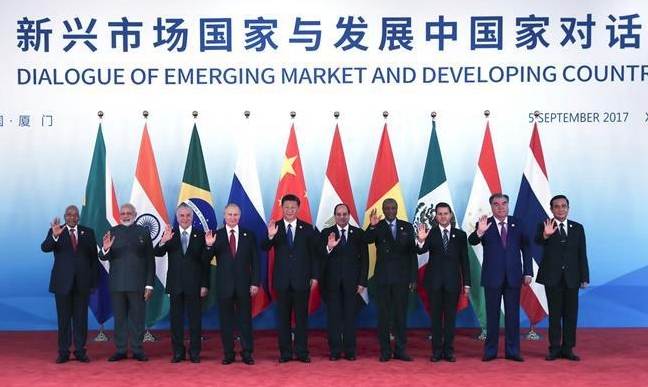'BRICS Plus' pushes for global governance reform
 0 Comment(s)
0 Comment(s) Print
Print E-mail Xinhua, September 6, 2017
E-mail Xinhua, September 6, 2017
The just-concluded 9th BRICS Summit was a show of Chinese wisdom on South-South cooperation and global governance, leaving behind "BRICS Plus" as one of its most important legacies.
|
|
|
Chinese President Xi Jinping (5th L), Brazilian President Michel Temer (3rd L), Russian President Vladimir Putin (4th L), Indian Prime Minister Narendra Modi (2nd L), South African President Jacob Zuma (1st L), Egyptian President Abdel-Fattah al-Sisi (5th R), Guinean President Alpha Conde (4th R), Mexican President Enrique Pena Nieto (3rd R), President of Tajikistan Emomali Rahmon (2nd R) and Thai Prime Minister Prayut Chan-o-cha pose for a photo before the Dialogue of Emerging Market and Developing Countries in Xiamen, southeast China's Fujian Province, Sept. 5, 2017. [Photo/Xinhua] |
The annual summit has gathered leaders from Brazil, Russia, India, China and South Africa to discuss pressing development issues from emerging economies. This year, China has proposed "BRICS Plus" by inviting leaders from Egypt, Mexico, Thailand, Tajikistan and Guinea for a dialogue on the sidelines of the summit.
Chinese President Xi Jinping's remarks on BRICS Plus have drawn a lot attention from many overseas experts, who have generally endorsed the idea, and look forward to the "second golden decade" of BRICS cooperation.
A bigger cake
During the Xiamen Summit, China held the Dialogue of Emerging Market and Developing countries, where leaders of the five BRICS Plus countries were invited to join the BRICS leaders.
Iqbal Surve, Chairman of South Africa BRICS Business Council told Xinhua on the sidelines of the summit that he personally welcomes the BRICS Plus initiative.
"That can only benefit the people of those countries," he said.
For Thailand businessman Dhanin Chearavanont, BRICS Plus certainly sounds promising. "It's certainly the more (countries) the better," the senior chairman of CP Group told Xinhua.
Chearavanont's company has already invested heavily in China, Russia and India, with more than 10 billion U.S. dollars' investment in China alone. There is massive potential in agricultural products consumption in the BRICS market, he added.
BRICS has a very positive theme and can lead to the development of Africa, Latin America and other countries, Atul Dalakoti, executive director of Federation of Indian Chambers of Commerce & Industry, told Xinhua after attending the opening ceremony of the BRICS Business Forum on Sunday.
"From that point of view I think a growing BRICS is a welcome thing," said the Indian businessman.
A stronger voice
Despite some saying the bloc losing its luster, many believe otherwise. "I think the bloc will still have relevance because this is a coming together of the developing world," K.V. Kamath, president of BRICS New Development Bank, told Xinhua ahead of the summit.
"This is only a beginning," said Kamath, adding that the influence that the BRICS countries will have in an economic context will only grow.
"BRICS continues to be and promises to emerge as a major influence in presenting a new model of financial governance as also in transforming conventional Bretton Woods financial institutions," said Swaran Singh, a professor of Center for International Politics at Jawaharlal Nehru University, in an email interview.
As President Xi put it in a Chinese saying, "It's easy to break one arrow but hard to break ten arrows bundled together." BRICS Plus is expected to expand the coverage of BRICS cooperation and enhance the strengths of the bloc in the international community.
Xi is now proposing a grand vision of global governance - stressing stability and mutual prosperity, Robert Lawrence Kuhn, chairman of the Kuhn Foundation and a longtime China expert and observer, told Xinhua via email during the summit.
"Properly positioned, BRICS can facilitate the continuing emergence of the largest developing countries to participate fully in a new kind of global governance, which humanity so badly needs in the 21st Century," said Kuhn.
The more, the merrier?
According to the BRICS Leaders Xiamen Declaration released on Monday, the bloc shall strive towards broad partnerships with emerging markets and developing countries, noting that the dialogue and cooperation with non-BRICS countries will be "equal-footed."
In that regard, Kuhn said China is "going out of its way" not to flaunt its power in the governance of BRICS. "For example, even though China's GDP is more than double the other four BRICS countries' GDP combined, each of the five countries has equal voting shares in the BRICS New Development Bank."
There are certainly differences among the BRICS countries, but "what unites them is stronger than what divides them," said Kuhn.
The expert noted that the continuing common interests among BRICS members have only grown greater over the past decade: a great need to increase international trade and a deep sense that the current international system does not properly represent the interest of the developing world.
Despite an overall optimistic view on the bloc's future, Kuhn suggested the bloc's members take into consideration the downside of potential expansion. "The larger the group becomes, it will be a larger challenge to maintain a unified focus that has substance," he said.
Chearavanont from Thailand's CP Group doesn't share Kuhn's caution. He believes the more, the merrier. "I hope more and more countries can join this bloc, not to move anyone's cheese, just to make a bigger cake."







Go to Forum >>0 Comment(s)